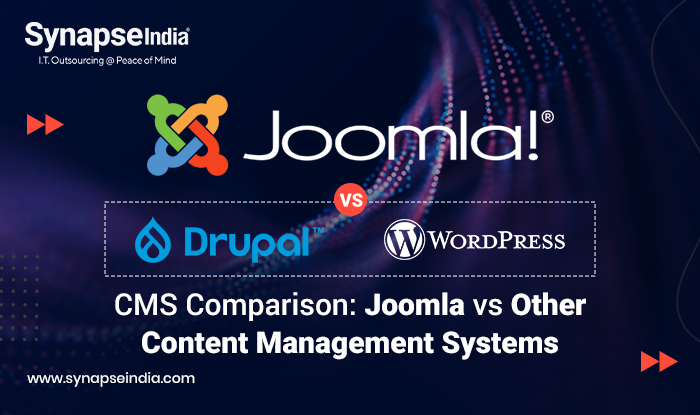 25 Jan 2024
25 Jan 2024“Joomla is a strong CMS option for creating websites due to it\'s flexibility, security, SEO, and Interface. Users can choose variety of plugins and themes to enhance website\'s functionality.”

Joomla is an open-source content management system (CMS) written in PHP and utilizing a MySQL database. Renowned for its user-friendly interface, flexibility, and extensibility, Joomla empowers users to create and manage websites of varying complexities. With a diverse range of templates and a robust extension ecosystem comprising components, modules, and plugins, Joomla developer allows for extensive customization and functionality enhancements. Joomla cms core features include content management, access control, multilingual support, and a commitment to security. Supported by an active community, Joomla development services provide a powerful platform for individuals and organizations to build and maintain dynamic web presences.

Joomla CMS boasts a range of features that contribute to its versatility and popularity as a content management system. Some key features include:
Joomla developer extension ecosystem is a standout feature, offering a wide array of components, modules, plugins, and templates. This extensibility allows users to tailor their websites to specific needs, whether it's adding e-commerce functionality, integrating social media, or enhancing security.
The built-in access control system enables administrators to define user roles and permissions, ensuring fine-grained control over who can access, edit, or publish content. The Joomla development is particularly useful for websites with multiple contributors or varying levels of content management responsibility.
Joomla CMS excels at managing content with its intuitive article and category structure. Users can easily create, edit, and organize content, and the platform supports various content types, including articles, blogs, and multimedia content.
Joomla's template system allows for seamless customization of a website's design. Users can choose from a variety of templates or create their own, providing a visually appealing and unique look for their sites.
Supporting multilingual websites, Joomla development services enable the creation and management of content in multiple languages. This feature is essential for websites with a global audience or those targeting diverse linguistic communities.
Joomla CMS is a versatile content management system (CMS) with a broad range of applications, making it suitable for various types of websites. Some common uses of Joomla CMS include:
Joomla is often used to create professional and feature-rich business websites. Its extensibility allows for the integration of e-commerce solutions, customer relationship management (CRM) tools, and other business-related functionalities.
Large organizations use Joomla to build intranets for internal communication and collaboration among employees. Extranets can also be developed to facilitate communication with external partners, suppliers, or clients.
The content management capabilities of Joomla make it an excellent choice for managing and presenting articles, blogs, and other written content. Many online magazines and news websites use Joomla to organize and publish their content.
Joomla is employed in education to create websites for schools, universities, and online learning platforms. Its user management features are useful for managing student and faculty accounts.
Nonprofit organizations and community groups use Joomla development services to build websites that promote their causes, share information, and engage with their audiences. Joomla developer CMS community features and customizable templates are beneficial for creating interactive online spaces.
Here is a detailed comparison that will help you to know why you chose Joomla cms over any other E-commerce platform. In this comparison of Joomla vs wordpress and Joomla vs Drupal, you will get to know why it is best for E-commerce website development.
| Aspect | Joomla | WordPress | Drupal |
|---|---|---|---|
| Ease of Use | Moderate learning curve; more complex than WordPress | Very user-friendly; great for beginners | Steeper learning curve; more complex backend |
| Flexibility | Highly flexible with a strong extension ecosystem | Flexible with a vast plugin repository | Extremely flexible; more developer-oriented |
| Content Management | Excellent content management capabilities | Strong content management features | Powerful content management system |
| Community Support | Active community with extensive documentation | Large and active community | Robust community; developer-focused |
| Extensions and Themes | Diverse range of extensions and templates | Abundant plugins and themes | Extensive module and theme options |
| Security | Regular updates for security; strong focus on security | Frequent updates for security; emphasis on security | Strong security features; focus on robustness |
| SEO Capabilities | Good SEO features with customizable URLs and metadata | SEO-friendly; many SEO plugins are available | Strong SEO capabilities; customizable URLs |
| Community Sites | Suitable for building community-driven websites | Can be used for community sites; BuddyPress | Excellent for community sites; Social module |
| Learning Curve for Users | Moderate learning curve | Very low learning curve | The steeper learning curve for users |
| Learning Curve for Developers | Moderate to high learning curve | The low learning curve for basic usage | Moderate to high learning curve |

Choosing the right Joomla services involves assessing your specific needs, considering the scope of your project, and evaluating the capabilities of service providers. Here are steps to guide you in selecting the right Joomla development services:
Clearly outline your project requirements, including the type of website you want, features needed, and any specific functionalities required.
Determine your budget for Joomla developer services. Different service providers may offer varied pricing structures, so understanding your budget constraints is crucial.
Look for reputable Joomla service providers. You can find them through online searches, recommendations, or Joomla community forums.
Ensure that the service provider has experience working with Joomla and has a proven track record of successful projects.
Examine the provider's portfolio to see examples of their previous Joomla development services projects. This can give you insights into the quality of their work and their design and development capabilities.
The Joomla Framework is a collection of libraries and packages designed to facilitate the development of web applications. Below are some key components of the Joomla Framework:
The Joomla developer Platform serves as the foundation for both the Joomla CMS and other web applications. It provides a set of reusable libraries and packages that developers can use to build custom applications.
The Joomla Framework is designed to be compatible with Composer, a dependency manager for PHP. This allows developers to manage and include third-party libraries in their projects easily.
The Joomla Framework promotes modularity and reusability of code, making it suitable for building scalable and maintainable applications.
Following the Model-View-Controller (MVC) architectural pattern, Joomla Framework encourages the separation of concerns, making it easier to manage and extend applications.
The framework includes features to enhance the security of web applications, including input validation, output escaping, and protection against common security threats.
Choosing Joomla over other frameworks depends on your specific needs, the nature of your project, and your preferences. If you prioritize content management, a vibrant extension ecosystem, and a supportive community, Joomla CMS could be the right fit. However, for projects with different requirements or preferences, exploring other frameworks might be more appropriate. It's crucial to evaluate each option based on your project's unique characteristics and goals.

 09 Aug 2023
09 Aug 2023
